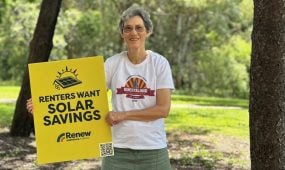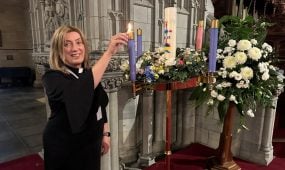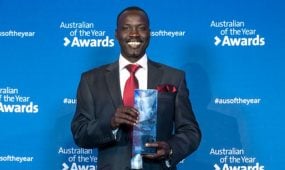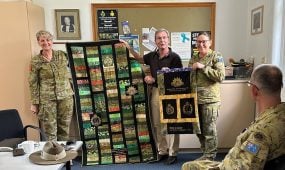Q&A with husband, father, Bishop and singer-songwriter, Cam Venables
Spotlight Q&A
Meet Bishop for the Western Region, Cam Venables, who celebrates his five-year anniversary as Bishop of the Western Region today, and find out about his future plans, faith journey, favourite films and books…and what he would put on a billboard if he could
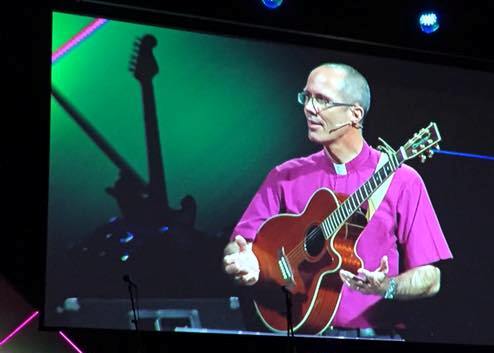
Bishop Cam Venables is married and has three adult children. In his Bachelor of Arts Honours thesis, he explored the effectiveness of Vietnamese refugee settlement in the UK between 1981 and 1983. After some years of community work in PNG, he studied theology in Brisbane. Currently working as Bishop for the Western Region, Cam enjoys meeting people from many walks of life. He has a deep commitment to justice, and enjoys music, reading, and writing.
How long have you been involved in the Anglican Church?
In many ways the Anglican Church has been part of my life right from the time I was born. As I grew up, and as I travelled far from the country of my birth, Anglican communities have consistently welcomed and nurtured me in life and faith…through to this day.
What is the name of your current role and what does your role involve?
These days I am a Regional Bishop in the Diocese of Brisbane with particular responsibility for the oversight of parishes and Anglican schools in the Western Region. This is a geographically large area, which includes the culturally diverse cities of Ipswich and Toowoomba, the huge sheep and cattle stations of the far west, and everything between. In addition, I have some oversight of Sudanese and South Sudanese congregations in the Diocese, and am a member of the Community Services Commission, which has delegated governance responsibility for Anglicare.
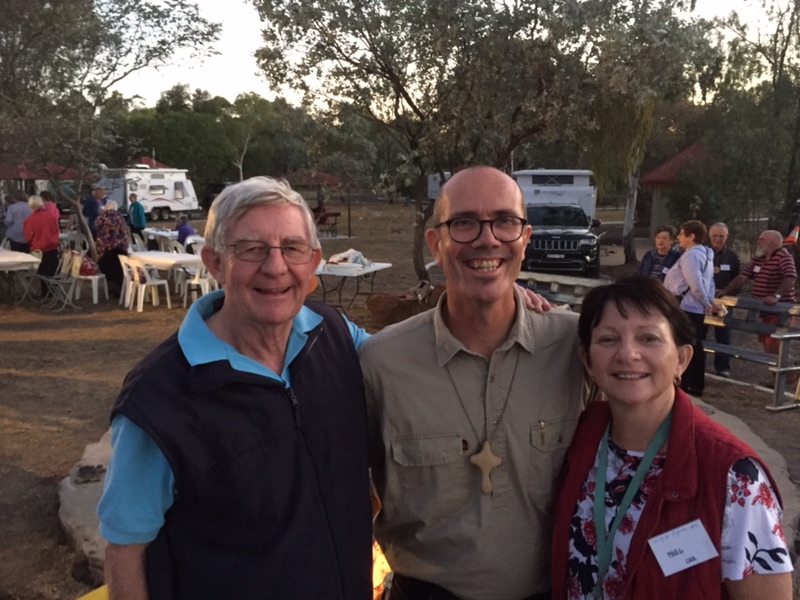
Bishop Cam with Birkdale parishioners, Ian and Margaret Carr, at a Cursillo Pilgrimage campfire in Mitchell, 2018
On 24 June 2019, you celebrate your five-year anniversary as Bishop of the Western Region: what have been the highlights of your roles so far?
There have been so many highlights, it is too hard to name one! In many ways there are good things, and tough things that happen every week. However, it consistently gives me joy when I see a Parish community, or school community, flourishing…through good leadership, and God’s grace. It also gives me joy when a parish or congregation have prayerfully worked through significant problems (maybe interpersonal conflict, or financial short falls)…and found a life-giving way forward. When I have been a part of that, it was very satisfying!
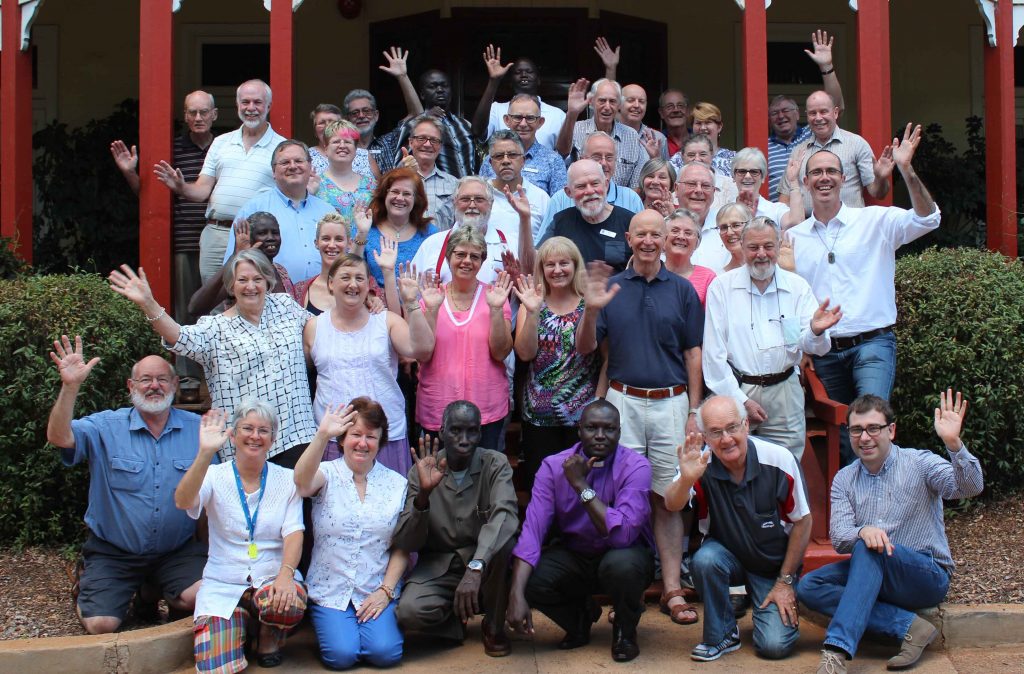
Bishop Cam with clergy at the 2017 Western Region Muster held at The Glennie School in Toowoomba
Why did you first decide to become a priest?
The short answer is that I think God wanted me to! Perhaps to help keep me faithful…perhaps to use the gifts I have in a constructive way…perhaps to be a very small cog in the ongoing project we call God’s Kingdom?
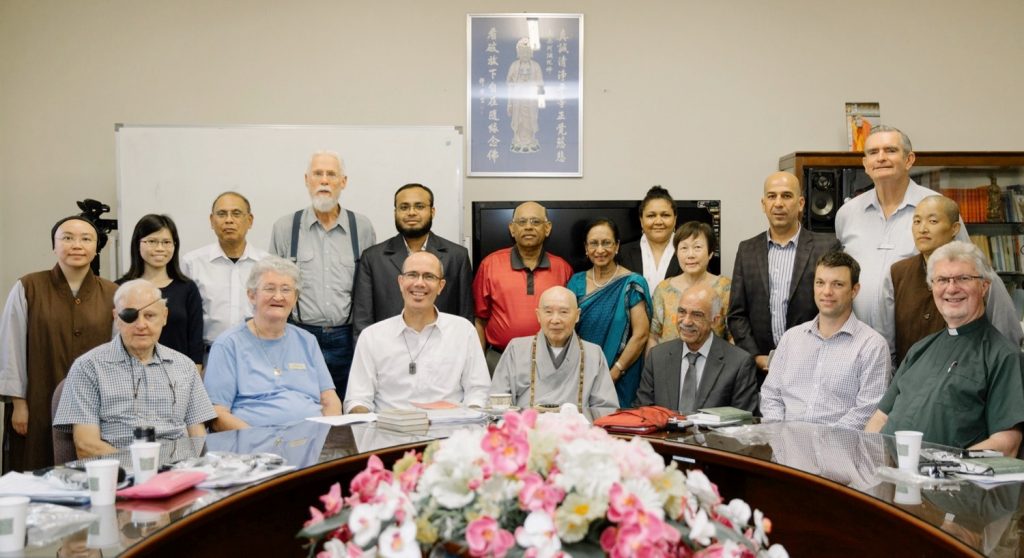
Bishop Cam with Master Chin Kung and members of the Toowoomba Interfaith Working Group (TIWG)
What advice do you have for those considering entering into the priesthood in our Diocese?
If you have the sense that God is calling you into leadership in the life of the Church, then ask others to hold you in prayer as you discern this further. The discernment process will help to clarify where the best fit is for the unique contribution you have to make. It may be as a priest, or it may be in some form of lay ministry…but, there is always a way for you to be part of the team.
Advertisement
What are your plans and goals for the next few years?
I’ve recently worked with a small team to survey how each Anglican Diocese in Australia is responding to the challenges of ministry in rural and remote Australia. I am planning to analyse this data and present to peers at a conference later this year, with the intention to get clarity about best practice and recognise strategies we have not yet considered. To get clarity about the best ways we can use the resources to enable ministry in the west is an important goal for me.
I am particularly fascinated by the developing potentials that digital technologies offer in this area, and am in dialogue with the University of Durham to explore this through further study.
Working with the current and emerging leadership of our Sudanese and South Sudanese congregations will continue to be a priority for me, with the goal that they better flourish and become an integral part of the rich complexity that is the Anglian Church Southern Queensland.
I think the Church needs people who are not only skilled in the traditional areas of preaching and pastoral care, but also leadership and management. I think developing greater competency and effectiveness in these areas will be important for all of us who serve as leaders as we plan for the future.
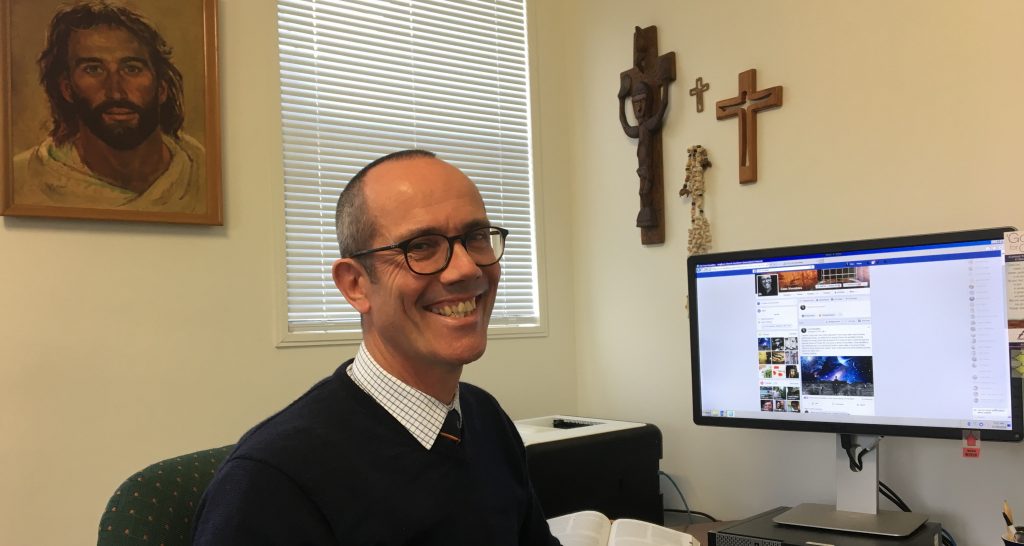
Bishop Cameron in his Toowoomba office engaging with a large Facebook community in September 2018. To connect on Facebook, send a request to ‘Cam Venables’
What are you most looking forward to at Synod this year?
In many ways the highlight for me is to meet people and hear what God’s been doing in their lives. I think the innovation of using ‘open space technology’ has great potential for us to listen constructively to each other, and to reduce the polarising dynamic of adversarial debate… o I’m looking forward to seeing how that goes.
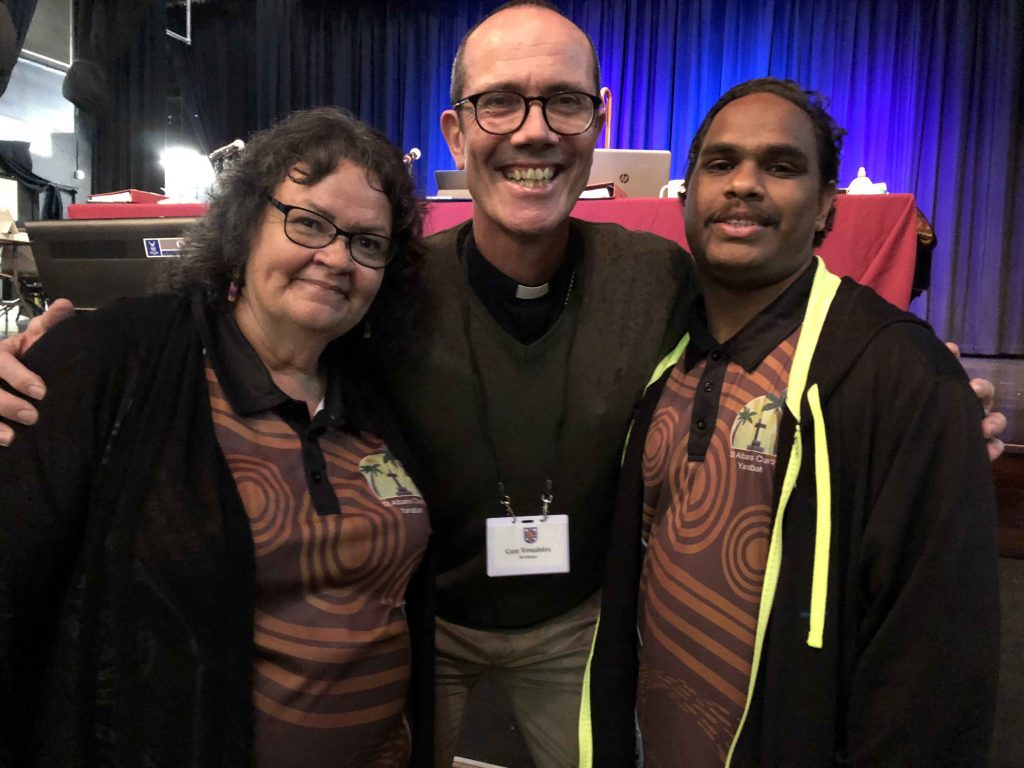
Bishop Cam and representatives from the Yarrabah community in North Queensland at ACSQ Synod 2018
Why is it important for us as Christians to serve the broader community?
The final judgement described in Matthew 25.31-46 powerfully encourages us to respond to human need, and suggests that we will be accountable to God if we don’t. But, it’s not the fear of judgement that is the driver for me here…it is the implicit challenge to recognise that Christ is present in each person. Not just the powerful and the pretty, but also the struggling and dysfunctional.
Advertisement
Can you tell us a little about your faith journey?
Growing up I really enjoyed church activity – particularly prayer, story, and music, but, I felt closest to God when walking in the woods, along the cliffs, and in wilderness areas. God experienced and named as Creator was foundational for me at this early stage. Through time as an undergraduate and then as a volunteer, the person of Jesus became more central in my journey of faith, and with this emerged a new experience and openness to the daily renewal of God’s Spirit, which continues to this day. As the journey continues to unfold the wisdom of Psalm 23 resonates more deeply.
What is your favourite scripture and why?
I love The Parable of the Prodigal Son (Luke15.11-32) when thinking of God’s love for every person, and The Parable of the Good Samaritan (Luke 10.25-37) when thinking about how to treat others around me, but the verse I have inscribed in my Bishop’s ring is Micah 6.8, as ‘Doing justice, loving kindness, and walking humbly’ are great principles.
What person of faith inspires you the most and why?
It is hard to choose one because there are many. However, I consistently find the life of Archbishop Oscar Romero to be an inspiration. He was open to being led by God from the comfortable world of academia, to the uncomfortable space of creatively speaking truth to power in ways that were heard.
What are the primary strengths of the church and what is the best way to make the most of these for the benefit of our communities?
I think the primary strengths of the Church include the belief that God loves all people, and that in Christ human beings can find peace, purpose, and community. I think people who have this faith, and live what they believe, will bless and benefit whatever community they are part of.
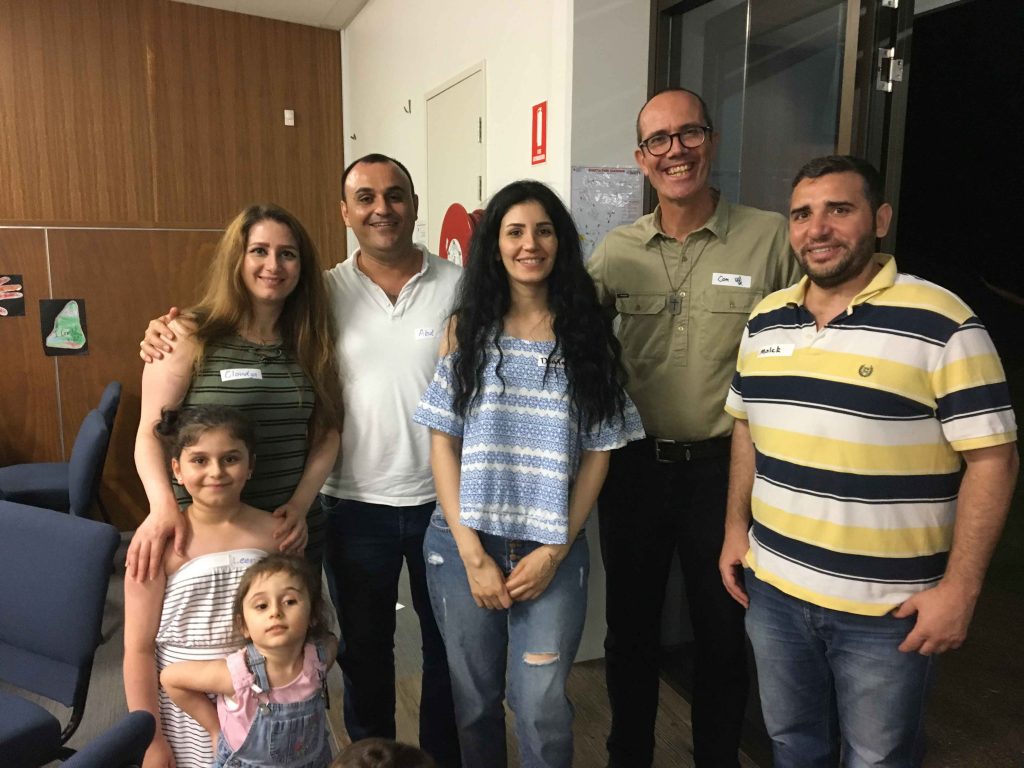
Bishop Cam with friends from Syria at a ‘Welcome Dinner’ organised by St Bart’s, Toowoomba in 2018
What are the challenges currently faced by the Church and what can be done to overcome these?
The challenges are many and some are grounded in a lack of credibility and a lack of vision. A world view informed by science and technology can challenge the credibility of a faith that interprets sacred writing literally. And, a society that honours money, and the things that money can buy, challenges the credibility of a faith that suggests the most important thing we do with our lives is love. And, in a competitive world where every organisation seeks to have a clear and intentional vision, I think we are often unclear, and do not offer a compelling vision.
What are the current challenges faced by people in Western Queensland and how can our broader Diocese help?
De-population, drought, and debt would be three of the challenges that immediately come to mind. There are much fewer people in Western communities compared with twenty years ago. The droughts seem to be longer and harder, and the debts related to drought survival are crushing and cumulative. Partnering with Western communities through the Bush Ministry Fund through prayer and financial support is one way to be part of things. Taking holidays in the unique and varied landscapes offered by Western communities and getting to know people in those communities is another.
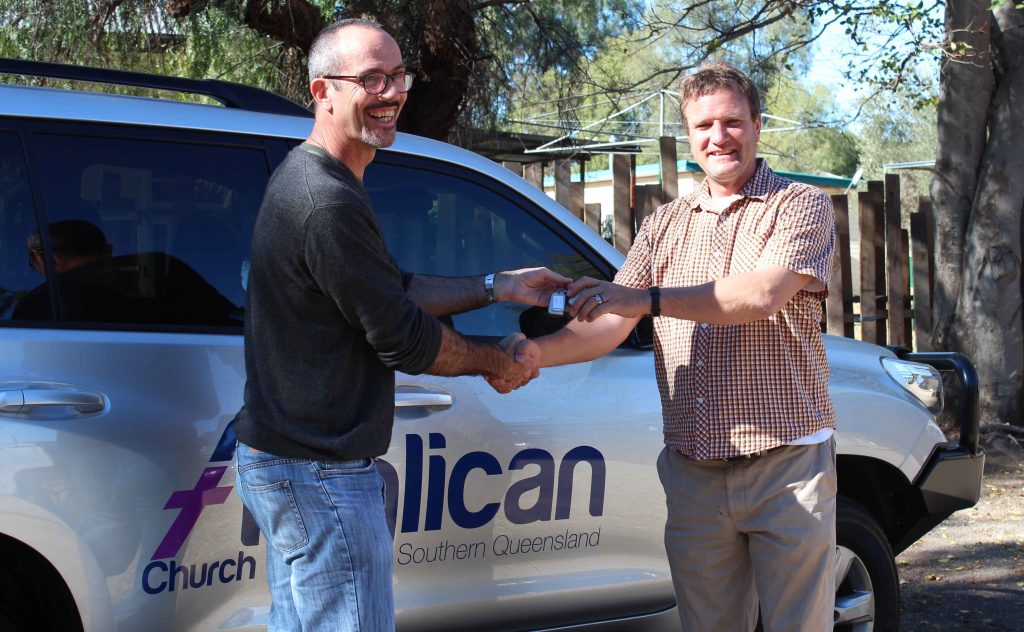
Bishop Cam presenting the keys of a new 4×4 to The Rev’d Steffan van Munster for ministry in the Maranoa-Warrego Anglican Mission Area in 2017
What do you do in your free time to recharge and relax?
I walk, work in the garden, play guitar, and write songs.
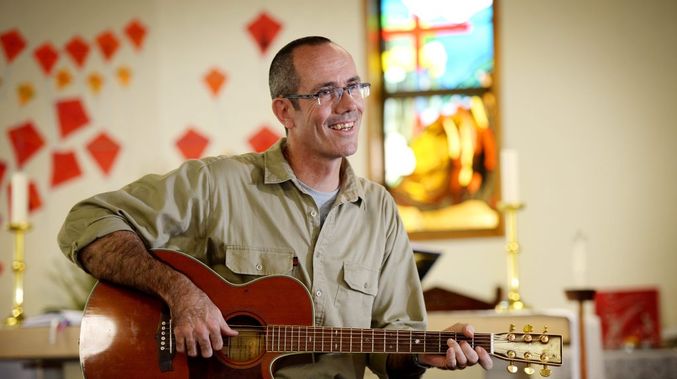
Bishop Cam in June 2014 photographed with guitar on his last day at All Saints’, North Rockhampton
If you found yourself on a deserted island, what three things would you choose to have with you?
A bush knife, a large box of matches, and a journal.
If you could have a billboard with any text on it, what would it say and why?
It would simply say, ‘God bless your journey…’ because it unconditionally desires wholeness in the life of all who see the message.
What book have you given away most as a gift and why?
Over the years the Bible is the book I’ve most often given for obvious reasons! There are then at least seven others that I have given more than ten copies of and most recently they include Dark Emu by Bruce Pascoe, and No Friend but the Mountains by Behrouz Boochani. Pascoe encourages us to understand Aboriginal history prior to European colonisation differently, and Boochani articulates the human cost of off-shore detention.
What is your favourite movie and why?
I think currently it is The Greatest Showman because it is a great story, which explores important themes, and has fantastic songs in the mix.
What is your favourite book and why?
Probably Four Fires by Bryce Courtney because it explores much about being human, while affirming goodness and striving. Against the odds little beats big, and the reader learns much about what is unique in Australian flora. All in all…it is a great read!
Where have you travelled to?
Very fortunate to have lived in three countries, and visited many more. A highlight last year was walking The Overland Track in Tasmania with my wife Kate, and climbing Mount Ossa.
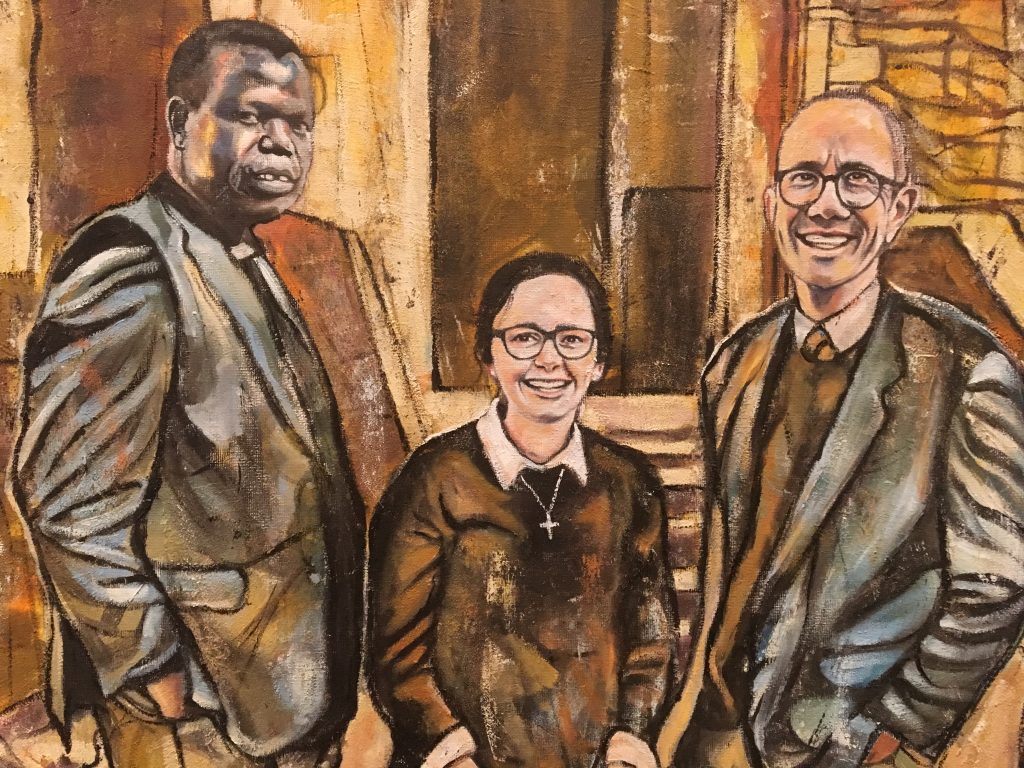
Assistant Priest at St Luke’s Anglican Church The Rev’d Peter Mayen, Chaplain at TACAPS The Rev’d Zoe Browne and Bishop for The Western Region The Right Rev’d Cameron Venables in ‘Toowoomba Churches’, by local artist Donna Mitchell and currently featuring in an exhibition at the Toowoomba Regional Art Gallery

